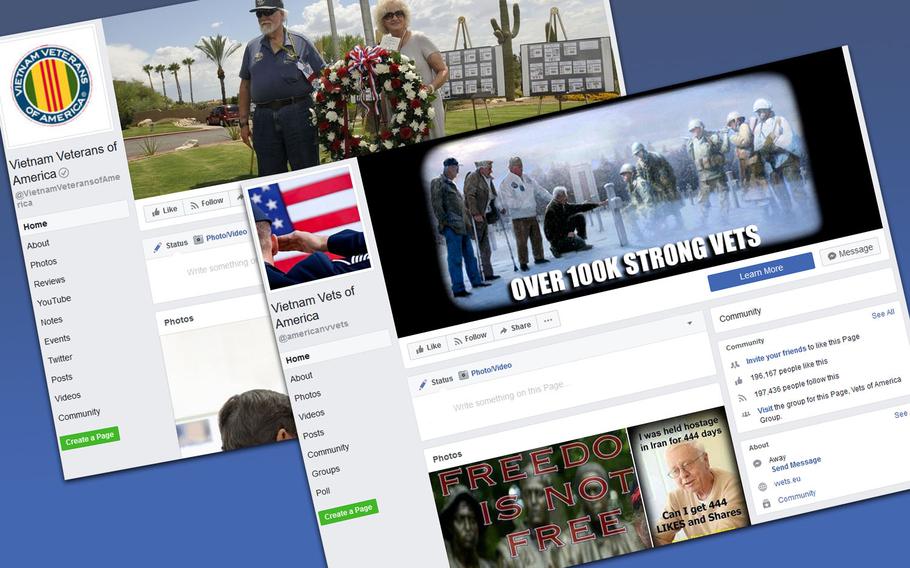
Vietnam Veterans of America, a congressionally chartered veterans service organization, runs a public Facebook page. Another page, Vietnam Vets of America, isn’t affiliated with a major veterans group. VVA calls them an "imposter page." (Stars and Stripes)
WASHINGTON — Vietnam Veterans of America, a congressionally chartered veterans service organization, runs a public Facebook page followed by almost 120,000 people and used by its leaders to post resources and news from its hundreds of chapters nationwide.
Another page, Vietnam Vets of America, isn’t affiliated with a major veterans group. It has created politically divisive posts that garner thousands of reactions and hundreds of comments, and the page has a follower-count reaching nearly 200,000.
Vietnam Veterans of America called the “imposter page” another example of the military and veterans community being targeted with disinformation.
But Facebook claims Vietnam Vets of America isn’t representing itself as Vietnam Veterans of America.
“Facebook has created a new universe that has tremendous positive attributes, that allows an organization like Vietnam Veterans of America to reach its members in all corners of the globe,” said Kristofer Goldsmith, assistant director for policy and government affairs with VVA. “But unfortunately, it’s also a platform that is easy for nefarious forces to take advantage of.”
A study from Oxford University earlier this month found Russian operatives used Twitter and Facebook to disseminate “junk news” to veterans and servicemembers.
Researchers with Oxford’s Project on Computational Propaganda, which is studying how Americans were affected by disinformation campaigns during the 2016 presidential election, found trolls and bots targeted military personnel and veterans with propaganda, conspiracies and hyper-partisan political content. The population of veterans and servicemembers contains “potentially influential voters and community leaders” because of the trust the public places in them, the study states.
Facebook, Twitter and Google will be questioned next month about how Russia was able to use their platforms to interfere in the election. Leaders of the social media networks were invited to testify before Senate and House intelligence committees Nov. 1. Facing public scrutiny, Facebook released copies of approximately 3,000 Russia-linked ads purchased around the election to Congress this month.
In an interview with Axios last week, Facebook COO Sheryl Sandberg said the social media network would be going after fake accounts, increasing transparency and hiring thousands of staff to improve oversight.
“We work hard to find the right balance between encouraging free expression and promoting a safe and welcoming community,” Facebook spokeswoman Ruchika Budhraja wrote Wednesday in an email.
Budhraja cited the company’s News Integrity Initiative and its News Literacy Working Group, which aim to help users make informed judgments about what they read and share. Facebook is also rolling out an education tool that will appear on users’ news feeds and include tips on spotting fake news, she said.
About the claim from Vietnam Veterans of America, Budhraja said Facebook’s Community Standards were not violated, and she encouraged the group to speak out and educate other users. Budhraja did not respond to a question about whether Facebook would work specifically to inform the veterans and military communities.
“As one would expect in a community of this size, false perspectives exist,” she said. “We have long believed that simply removing provocative or even blatantly false perspectives has less impact than providing an open forum where people can question and dispute misinformation and learn from each other.”
But VVA says more needs to be done.
John Rowan, president of Vietnam Veterans of America, said in a statement that his group first reported the Vietnam Vets of America page to Facebook’s security team in August and has been “quietly trying to push Facebook to close down fake pages” that imitate the organization.
The administrator for Vietnam Vets of America did not respond to request for comment on the accusations.
In addition to those pages, Rowan also said international “spam-bots” were targeting individuals within the VVA.
Because Facebook and Twitter hadn’t shut down the accounts, VVA is urging the Defense Department and Department of Veterans Affairs to get involved.
“I think it’s unfortunate that Facebook isn’t taking a more proactive stance in addressing these concerns,” Goldsmith said. “I don’t know that any veterans organization has the capacity to fight this on our own. I hope that other veterans organizations start to speak up on this topic, and I hope the DOD and VA recognize they have a responsibility to protect our communities.”
wentling.nikki@stripes.com Twitter: @nikkiwentling